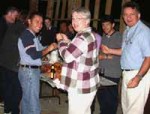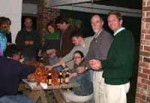Victor H. Rivera-Monroy Florida Coastal Everglades LTER
To develop and advance a research agenda for long term ecological studies in the Wider Caribbean Region, two workshops were hosted by the Florida Coastal Everglades-LTER (FCE-LTER) program at Florida International University (March 20-23 2001) and the Center for Ecology and Environmental Technology, University of Louisiana at Lafayette (March 21-24 2002).
Thanks to the efforts of Dan Childers, lead Investigator of the FCE-LTER program and funding from the LTER Network office we had the opportunity to bring together Caribbean coastal scientists representing a considerable diversity of tropical coastal ecosystems. Ernesto Weil (Puerto Rico), David Bone (Venezuela), Jorge Herrera-Silveira (Mexico) in collaboration with scientist from Florida International University (Dan Childers, Jenny Richards, Rudolf Jaffe, Joel Trexler), the Smithsonian Environmental Reserch Center (Candy Feller), South Florida Water Management District (Chris Madden, Carlos Coronado-Molina), the University of California at Davis (Eliska Rejmankova), and the University of Louisiana-Lafayette (Victor H. Rivera-Monroy, Robert R. Twilley, Ernesto Mancera) discussed several issues related to the effect of human impacts on ecosystem health in the Caribbean region. In addition to these sponsored participants, over 20 scientists and students participated in these workshops.
The main products of the workshops were the development of a conceptual model of the terrestrial, oceanic, and atmospheric controls affecting Caribbean coastal systems, and a categorical quantification of these important environmental driving variables for 13 Caribbean coastal research sites; these sites were represented by workshop attendees. As a corollary of this effort, a multi-authored synthesis paper is in preparation where the conceptual model and matrix of environmental drivers are presented as a template for coordinating cross-Caribbean coastal research. It is expected that this collaborative effort will provide an opportunity to integrate research priorities into a long-term research agenda. The Caribbean region is one of the top five biodiversity ‘hot spots” identified around the world (i.e., an area with exceptional concentration of endemic species but undergoing an exceptional loss of habitat) and where 19 RAMSAR Convention sites and 21 coastal Biosphere Reserves are located.
The LTER Network office is greatly acknowledged for sponsoring both workshops.

 Enlarge this image
Enlarge this image
